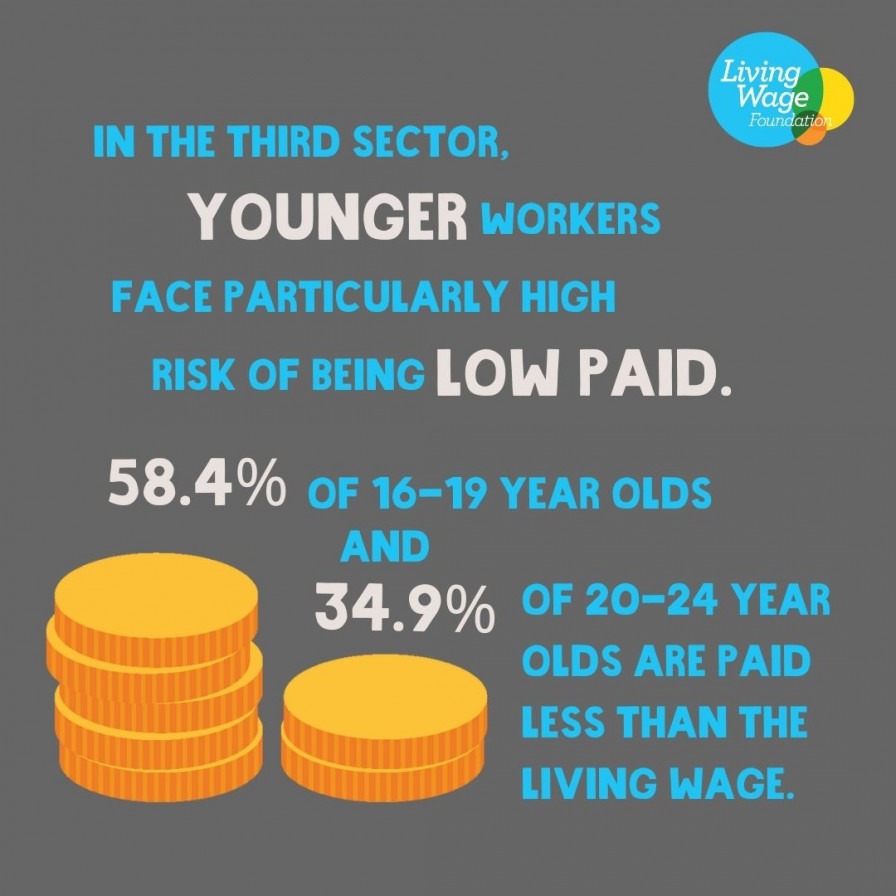All work and low pay?

Report finds low pay in the third sector is reinforcing inequality.
A new report by the Living Wage Foundation has found that low pay is still a significant issue in the Third Sector. Fourteen per cent of jobs are paid less than the real Living Wage, much higher than the public sector at 5.5%.
Whilst the proportion of low paid jobs has declined over recent years, low pay affects certain groups of people more than others. Not surprisingly, those groups are people already facing inequality: women, certain racialised groups (other ethnic, Pakistani and Bangladeshi, Black African, Black Caribbean and Black British), Disabled people and young people.
What is the real living wage?
The real living wage (not to be confused with the Government’s similarly-named ‘living wage’) is a UK wage rate based on living costs. It’s currently £9.90 per hour, rising to £11.05 per hour in London. The Government living wage rate is £9.50 per hour, falling to £6.83 for 18-20 year olds and £4.81 for 16-17 year olds.
Youth Music is a Living Wage Funder, which means that we expect all people employed on Youth Music-funded programmes to be paid the real living wage. We’re also an accredited living wage employer, part of a movement of over 10,000 employers who commit to paying our staff and contractors the real living wage.
We’re a living wage funder because we’re a charity that exists to support young people. We think it’s unfair that under the Government’s ‘living wage’ you could be a 17 year old doing an identical job as a 30 year old, but getting paid £4.69 less per hour. In a full time job you’d earn over £9,000 per year less.
Is the Third Sector shooting itself in the foot?
The report points out that some of the drivers of low pay relate to ‘market forces’, particularly commissioning models which encourage people to do more for less. But there is also a perception in some quarters of the sector that keeping wages low means that you’re being a responsible steward of charity resources.
According to John Hume, CEO People’s Health Trust and Chair of the Living Wage Third Sector Steering Committee:
“Perhaps one of the most surprising revelations of the report is that low pay is a cultural issue. There is a kind of own goal dogged belief that the public’s rightful concern over the effective stewardship of charity resources means not paying some of our lowest paid workers the real Living Wage”.
This perception has shifted in recent years, thanks in part to the 58 funders who have signed the Living Wage Funder commitment. Youth Music has recently developed some ‘budgeting principles’ to support organisations applying for a Youth Music grant. These principles encourage organisations to recoup the full cost of delivering a Youth Music project, and ensure that people are fairly paid.
What can you do to help?
With the full effects of the cost of living crisis looming, there are a number of things you can do to help your employees and freelance workforce.
- Pay people the real living wage (or a higher rate, especially if they are freelance).
- The real living wage rates are set to rise in September. Speak to your funders about what flexibility exists within your grant budget in order to accommodate pay increases.
- Sign up as an accredited Living Wage employer and join the wider fair pay movement.
- A real living wage is not a real living wage if you’re only working 2 hours per week. If you employ people part time or engage freelancers, review the living hours scheme and see how you can meet the standard. If this is not practically possible, then speak to your freelance workforce about how you can make it easier for them to engage in multiple contracts.

